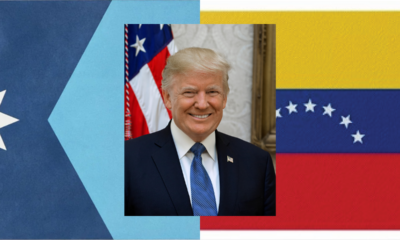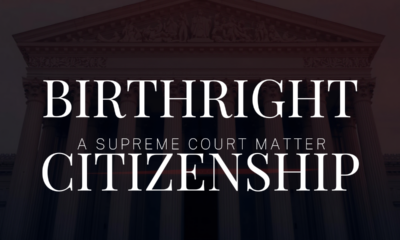Christianity Today
Father’s Day – where are you?
Father’s Day reminds us of the importance of fathers, and of the awesome responsibility they bear. We ignore this at our peril.
Today is Father’s Day. Father’s Day is not uniquely American, but it did start in America. And today is a good time to remember the essential role fathers play, in families and in civilization. But our society seems to have forgotten how important a father is. So it’s time to remind ourselves.
Where did Father’s Day come from?
The History Channel and YP Discover tell us that. Like much else, the Father’s Day custom started in a church. The first service to honor fathers came on July 5, 1908, near Monongah, West Virginia. In the winter of 1907, more than 360 coal miners from Monongah died in an explosion. But mass-casualty events usually have another kind of casualty: those the prime casualties leave behind. In this case we’re talking about 200 widows and more than 1,000 children now without fathers.
So Grace Golden Clayton of the nearby town of Fairmont proposed a memorial to honor those 200 fathers. But this was a one-off event and did not have any staying power.
But in 1910, Sonora Smart Dodd of Spokane, Washington, proposed an official holiday from fathers. She took inspiration from a sermon on Mother’s Day. Mrs. Dodd had good reason to want to honor fathers. Her own, William Jackson Smart, had raised her and her five siblings alone after their mother died in childbirth.
So she shared her idea with local churches, merchants, the Young Men’s Christian Association, and with State officials. Washington State celebrated the first Father’s Day on June 19, 1910. Thus today, the 113th Father’s Day, happens to fall on the same date as the first.
Other countries have copied Father’s Day from the United States, but usually not on the same day. The American Father’s Day falls on the third Sunday in June, as it has from the first.
Fathers are important!
Fathers are important to families, and have been since the creation of man. Nor does fatherhood limit itself to human beings. True enough, most animal species have little use for the male other than siring. Male insects usually die after mating (except for the “King Termite”). Males of the deer kind (Family Cervidae) typically appear during “rut” and then disappear for the rest of the year.
But human fathers have definite duties. When they ignore them – or when circumstances remove them – the results can be disastrous.
A father demonstrates not only good behavior but also the concept of responsibility. Families – at least well working families – expect the father to provide, protect, and command. A good father teaches a child by example, if not always by direct precept. But a good father never exploits.
The Bible has many examples of good fathers – and bad fathers. For good or bad, children learn from their fathers. Solomon learned from David. Sadly, Solomon did not provide good lessons for his son and heir, Rehoboam – so Rehoboam’s reign was a disaster. Not only did he lose eighty-three percent of the kingdom, but he almost lost it all in a disastrous war with Egypt. Likewise, Ahab provided a horrible example as a father to his daughter Athaliah, who tried to secure her throne by murder.
Can a son do better than the father?
Rarely, a son can overcome the lessons from a bad father – if he has another man in his life to teach him the right way. We saw that from at least five of the Kings of Judah: Asa, Joash, Uzziah, Hezekiah, and Josiah. We can assume that the high priest in each case intervened when each man was young. (In some cases, Scripture makes this explicit.)
More often, the son either follows the father’s example, or else did not have an example to follow. The National Fatherhood Initiative has facts and figures to back this up. They illustrate their points brilliantly with posters that catch the eye. According to them, without fathers, children are more likely to:
- Live in poverty,
- Have behavioral problems,
- Die in infancy,
- Go to prison,
- Commit a crime,
- Become pregnant as a teen,
- Suffer abuse and neglect,
- Abuse drugs and alcohol,
- Grow obese,
- Drop out of school, and/or:
- Kill themselves
Nor does fatherlessness limit itself to a household that doesn’t have a father. Fathers who neglect their homes often see the same results as if the fathers were not present at all. This shows that fathers must be not only present but involved.
Who says fathers are superfluous?
Today a small but vocal minority, probably of persons who suffered from father absence themselves, think fathers are superfluous. We see fiction and drama that insults fathers and shows mothers and children “getting along just fine without them.” Try to remember, when you see such dubious art, that it is fiction and fictional drama, not true biography.
This vocal minority tries to excuse their position by saying some children are better off fatherless. They might be better off fatherless than with a dangerous and abusive father. But that does not make them well-off.
Some who try to make the case for fatherlessness, end up proving the need for fathers. Jamil Jivani, writing in The Guardian, provided a prize example two years ago.
If you choose the right inspirations, growing up without a dad can be a gift. But, as the title of Jay-Z’s album Blueprint 2: The Gift and the Curse suggests, there’s a flip side. Many of us who spend Father’s Day wishing we had somebody to celebrate with haven’t chosen the right influences as substitutes. We might not be making many choices at all.
Jay-Z himself boasted of the freedom to choose one’s ancestors. But how do you know you’re choosing the right ancestors? You don’t.
This Father’s Day …
This Father’s Day, remember what a father should be, and why children need fathers. A father has an awesome responsibility – which is why Sonora Smart Dodd had the right idea, one hundred twelve years ago. Father’s Day is a time to celebrate the role of fathers. It is also a day for sons to contemplate the responsibility to which they will, someday, succeed.
Terry A. Hurlbut has been a student of politics, philosophy, and science for more than 35 years. He is a graduate of Yale College and has served as a physician-level laboratory administrator in a 250-bed community hospital. He also is a serious student of the Bible, is conversant in its two primary original languages, and has followed the creation-science movement closely since 1993.
-

 Civilization4 days ago
Civilization4 days agoWhy Europe Shouldn’t Be Upset at Trump’s Venezuelan Actions
-

 Executive5 days ago
Executive5 days agoHow Relaxed COVID-Era Rules Fueled Minnesota’s Biggest Scam
-

 Christianity Today4 days ago
Christianity Today4 days agoSurprising Revival: Gen Z Men & Highly Educated Lead Return to Religion
-

 Civilization5 days ago
Civilization5 days agoThe End of Purple States and Competitive Districts
-

 Executive4 days ago
Executive4 days agoWaste of the Day: Can You Hear Me Now?
-

 Civilization2 days ago
Civilization2 days agoWhy Europe’s Institutional Status Quo is Now a Security Risk
-

 Civilization3 days ago
Civilization3 days agoDeporting Censorship: US Targets UK Government Ally Over Free Speech
-

 Civilization1 day ago
Civilization1 day agoTariffs, the Supreme Court, and the Andrew Jackson Gambit












